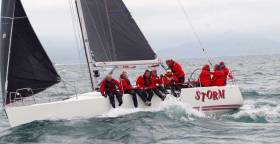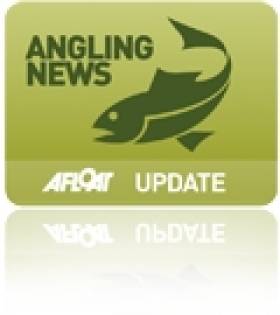Displaying items by tag: Celtic Cup
RYA Northern Ireland Youth Squads Shine at Celtic Cup in Pwllheli
Ten of Northern Ireland’s Topper and ILCA sailors travelled to Plas Heli in Pwllheli for the Celtic Cup earlier this month (3-4 February).
This annual event sees the best youth and junior sailors from Wales, Scotland and Northern Ireland compete for the accolade of top Celtic nation.
And this year it was Wales who claimed the crown with a narrow single-point victory — though the RYANI contingent put in a strong showing, edging the overnight leads in both classes.
The event also provided a great opportunity to solidify friendships with the other Celtic nations, which will be even more vital in light of the summer events schedule with competitions such as the ILCA 6 Youth Europeans at Ballyholme Yacht Club.
For more see the RYA website HERE.
Scotland Pip Northern Ireland at RYA Celtic Cup Youth Sailing Event
The last weekend of January saw the RYA Celtic Cup hosted by RYA Scotland at Largs Sailing Club, and taking part were RYANI Youth Sailing Squad Members with RYA Wales and RYA Scotland. As well as racing for the Celtic Cup there was coaching for Optimist, Topper and ILCA 6 classes.
The event brought together the best ILCA and Topper sailors from each home country to compete for the overall team prize. It’s the first time the event has run since 2013 and the intention is that this will be an annual fixture alternating between the home countries of Scotland, Wales, and Northern Ireland. The event serves as a combined training session with races included to constitute the Celtic Cup.
Chosen to represent Northern Ireland were two youth members of East Antrim Boat Club at Larne, ten from Ballyholme on Belfast Lough and four from County Antrim YC. The EABC sailors were Tom Coulter and Matthew McClernon in the ILCA division and the four from BYC in the same class were Charlotte Eadie, Joshua McGregor, Lewis Thompson and Lucas Nixon. From County Antrim Yacht Club on Belfast Lough were Ellen Barbour and Daniel Corbett. In the Toppers were Bobby Driscoll, Cormac Byrne, Henry Nelson, Autumn Halliday, Katie Brow and Emily McAfee from Ballyholme but due to unforeseen circumstances Katie and Emily were unable to travel. And the CAYC sailors were Rory Pollard and Luke Simpson.
 The RYA Northern Ireland Celtic Cup Laser team
The RYA Northern Ireland Celtic Cup Laser team
The team was accompanied by coaches, Chris Penny and Barry McCartan along with Andrew Baker, Performance Manager for RYA NI.
Saturday brought heavy winds and unsettled seas with a baseline wind speed at Largs of 38 kts with gusts of 48 kts and the forecast was windy for the rest of the day. So a coaching session was held which comprised an early gym session before breakfast, followed by a packed programme of workshops, talks and teambuilding activities. Athletes were mixed up across countries and teams, to share experiences and learn with different sailors and coaches.
Sunday’s weather to start with was a complete contrast and before the heavy weather which was forecast arrived there was a flurry of activity in the boat parks and marina with race management, mark personnel and coaching staff getting their respective teams launched and the course set. With RYA Scotland’s Performance Manager, Matt Toynbee keeping an eye on the water proceedings accompanied by Kate Pounder, RYA Scotland’s Performance Sailing Officer, a trapezoid course was set and the Race Officer got racing underway in 13 kt winds from the south. As predicted, the wind continued to build quickly over the morning and by 1230 hrs the competitors were racing in 25 knots with a big sea, making for very challenging sailing conditions. Unsurprisingly the high winds produced capsizes in the last race. With no change in sight the decision was taken to finish racing for the day at lunchtime with four races completed in the ILCA 6 Class and three in the Topper and Optimist classes.
The individual results in the ILCA 6 saw Tom Mitchell from Scotland take first place with four bullets, second place went to Finlay Tulett also from Scotland and the best NI results came from Tom Coulter (EABC) at third, and in fourth, Josh McGregor of BYC; Ellen Barbour of County Antrim was sixth and Lucas Nixon (BYC) eighth. In the Topper Class, BYC’s Bobby Driscoll, took the individual win and his clubmate Autumn Halliday was runner up. In third was Finley Briggs from Scotland. Rory Pollard was ninth.
The Celtic Cup was awarded to the RYA Scotland team, with RYA NI coming a close second and RYA Wales, third.
Ballyholme’s Aidan Pounder (Recognised Training Centre Principal) said “It was a great event and experience and thanks to RYA Scotland for hosting and to the RYA NI Team and Coaches for their great preparation and support. We look forward now to 2023, where The Celtic Cup will be contested either in Wales or Northern Ireland”.
Andrew Baker, RYANI Performance Manager said; “it was a very close fight between Scotland and Northern Ireland. With Scotland’s top two in the ILCA and consistently mid-fleet in the Topper they just managed to pip us. Notable results were Bobby Driscoll (BYC) and Autumn Halliday (BYC) in the Topper, and Tom Coulter (EABC) and Josh McGregor (BYC) in the ILCA. A few black flags and breakages may have come into the mix but show’s we can be competitive. I am sure we can bring the cup home next year.”
2019 IRC Welsh Nationals Set For 9-11 August
Save the dates 9 to 11 August 2019 in your calendar for the Spinlock IRC Welsh National Championships, which promises a long weekend packed full of great racing and fun ashore
Once again the Welsh Nationals have been selected as the Welsh leg of the RC35 class Celtic Cup, won in 2018 by Irish boat Storm.
The Welsh National Sailing Academy and Events Centre in Pwllheli looks forward to welcoming sailors from across the UK and Ireland for racing in the world-renowned waters of Cardigan Bay, with the majestic backdrop of the mountains of Snowdonia and the rugged coastline of the Llyn Peninsula.
The championships will feature two separate race courses, one for the IRC fleets and Sportsboat class and a separate course for the Cruiser class, so there will be something for everyone.
The Notice of Race and entry form are now available online. IRC certificates are not required at this time, only basic details and general information about your boat.
All entries made before Thursday 31 January will be included in a super early-bird prize draw with Spinlock goodies to be won.
Events pontoons will once again be available for use before and during the championship without any additional charges. Book your space now in the entry form.
Berthing will also be available for boats competing in the ISORA race from Dun Laoghaire to Pwllheli on Saturday 27 July for those who wish to leave their boat in Pwllheli ready off the IRC Championships.
This year the camping facilities at the academy will be available for participants. Bring your campervan or caravan to set up your base camp right on the venue site. More details and online booking can be found on the Plas Heli website.
There will also be a limited number of bunk beds available on on a first come, first served basis. Details about this added facility will be circulated to entered boats first.
Organisers will arrange shore storage so that your delivery sails, life-rafts and associated gear can be stored for the duration of the event. Please indicate on the entry form if you would like shore storage.
And of course, there will be a full social programme ashore. Details will be circulated by e-newsletter and published on the official championship website in due course.
Dates Announced for Coarse Fishing Qualifiers in 2012
#ANGLING - Qualifiers to select teams for the 2013 World, European and Celtic Cup coarse fishing teams will be fished over six weekends in 2012.
The float and feeder teams for the National Coarse Fishing Federation of Ireland (NCFFI) squads will be decided via an All Ireland Qualifier format to CIPS rules.
Team manager Mark Theedom will select his teams from the top 20 anglers in the float qualifiers and the top 50% of anglers taking part in the feeder qualifiers.
The series will be open to all anglers who are members of NCFFI-affiliated clubs, and is intended to be more inclusive and encourage many more anglers to participate.
All senior anglers will pay an entry fee of €60 for the six-match series which will help fund teams travelling to the 2013 championships. Individual anglers not intending to fish the series but wishing to fish individual qualifiers in their local area will be charged €15. Juniors will not be expected to pay any entry fee.
The qualifier weekends are as follows:
- 21-22 April – River Barrow, Co Carlow
- 19-20 May – Inniscarra, Co Cork
- 2-3 June – River Shannon (O’Brien’s Bridge), Co Clare
- 11-12 August – Lough Muckno, Co Monaghan
- 22-23 September - Lough Oughter, Co Cavan
- 20-21 October – Lower River Bann, Co Antrim






























































